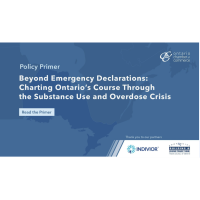-
Urgent Action Needed to Address Substance Abuse and Overdose Crisis
-
May 24, 2024
Urgent Action Needed to Address Substance Abuse and Overdose Crisis
Ontario Chamber Policy Brief Highlights Impact on Business, Need for Strategic Interventions(Sault Ste. Marie – May 24, 2024) – Ontario faces an alarming projection: over 3,000 annual drug poisoning deaths for the fifth consecutive year, translating to more than eight fatalities daily. As they find themselves near the frontlines of a substance use and overdose crisis, businesses are issuing urgent calls for action, emphasizing the need for strategic interventions in Ontario communities.
Yesterday, the Ontario Chamber of Commerce (OCC) released Beyond Emergency Declarations: Charting Ontario’s Course Through the Substance Use and Overdose Crisis. This policy brief aims to simplify the complex narrative surrounding substance use, bridge the knowledge gap between stakeholders, and underscore the need for evidence-based, community-informed solutions that prioritize public health principles, prevent mortality, and improve recovery outcomes.
“Here in Sault Ste. Marie, we are grappling with an escalating substance abuse and opioid crisis that we are ill-equipped to manage. Local businesses are struggling with rising security costs and decreasing customer traffic,” said Sault Ste. Marie Chamber of Commerce, CEO, Rory Ring. “This brief calls upon the decision-makers to think outside the silos of any one particular addictions management approach and urges the collection of better data to drive evidence-based solutions.”
“The call for collaboration of industry, government, healthcare, and community organizations to work together, is not simply a call for action, it is the business community’s expression of a desire to be a part of the solution.” said Sault Ste. Marie Chamber of Commerce, President, Derek Jackson. “When discussing the impacts on business, the narrative often goes to crime however, substance use and the overdose crisis goes far beyond this, directly or indirectly impacting all employees, customers, family members, stakeholders, and community at large. It is imperative that all sectors work together to not only mitigate the impacts on our businesses, economy, emergency services and communities, but also to ensure tactics and solutions are part of an all-encompassing approach to this immensely complex and far-reaching issue.”
Driven by stigma within healthcare settings, obstacles to treatment, declining mental health, and the escalating toxicity of the drug supply, the crisis disproportionately affects northern, remote, and rural communities, which grapple with limited access to support services and much higher overdose rates. Strategies across Canada vary, from harm reduction efforts in B.C. to recovery-focused models in Alberta to Ontario’s focus on creating a continuum of care. Comparing these strategies - and their outcomes - will be essential, the OCC brief finds.
The OCC thanks its lead partner, Indivior, and its supporting partner, the Provincial Building and Construction Trades Council of Ontario, for supporting this work.
-
Noah Thomson
- May 24, 2024
- Send Email
-
-
Upcoming
Events
-
Your RecognizedVoice of Businessin Sault Ste Marie

